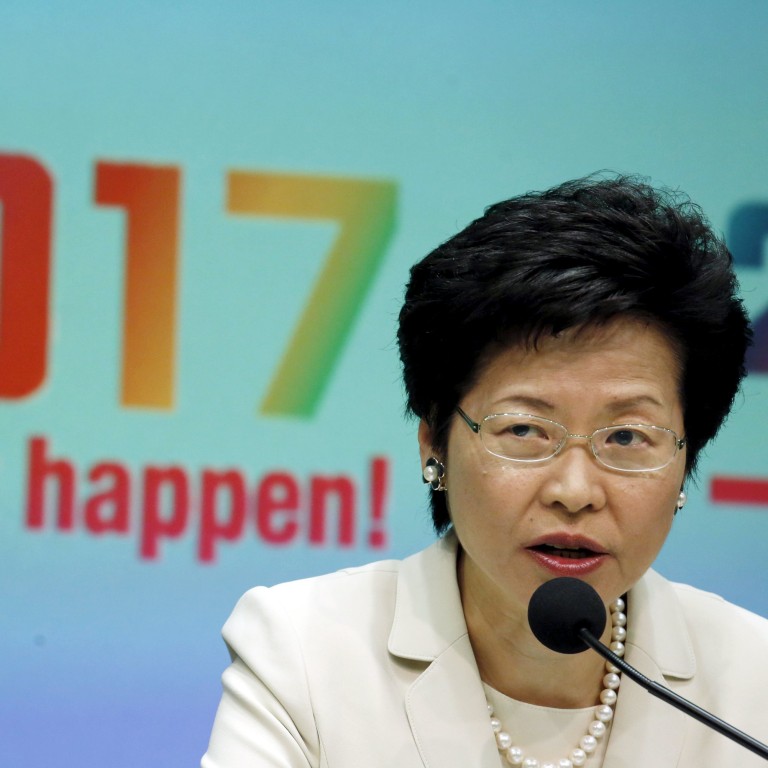
Hong Kong's political reform package will put real power in the hands of the people
Regina Ip says the proposal offers a major step forward for Hongkongers and the benefits it will bring in terms of better governance are too great to be ignored
Sixteen months after the government kicked off its consultation on constitutional reform, Hong Kong is finally in the last leg of the quest for the holy grail of universal suffrage. On Wednesday, amid hysterical screams of rejection and a walk-out by pan-democrat legislators, the chief secretary unveiled the proposed amendments to the provisions in the Basic Law governing the election of the chief executive in 2017.
Working within the constraints of Beijing's August 31 decision and its political requirements that the popularly elected chief executive must be someone "who loves the country and loves Hong Kong", the package is arguably more liberal than expected, and offers a much greater chance for a pan-democratic candidate to be nominated.
The government proposed that the number (1,200) and the sectoral composition of the nominating committee will follow that of the existing Election Committee. However, unlike existing nomination procedures, there will be a two-step process, including a low threshold (120) for "recommending" candidates, who will be prohibited from seeking individually more than 240 recommendations. The upper limit is proposed to ensure that no single, dominant candidate would flush out other competitors in round one.
Under such arrangements, five to 10 candidates could be "recommended" and advance to the next stage. The proposed rules for nomination require that each nominating committee member must nominate at least two candidates, but can nominate as many candidates as have been recommended. A maximum of 12,000 votes could be cast by nominating committee members.
In such a scenario, a large number of candidates from both the pro-establishment and pan-democrat camps could be "recommended". The top three candidates able to secure the majority support of the nominating committee will advance to popular election.
In past elections, the number of candidates an Election Committee member could vote for was limited by the number of votes he or she had - a maximum of one. But under the new rules, with far more votes at his or her disposal, a nominating committee member would have far more choices, and much greater freedom to nominate a convincing candidate, irrespective of the candidate's political background.
This method of voting, which political scientists classify as "approval voting", is adopted by the UN General Assembly in electing its secretary general, after nomination by the Security Council. As the UN experience shows, "approval voting" has the advantage of fostering the selection of a consensus candidate, a person who attracts the least objection and is most capable of accommodating diverse interests and factions.
Pan-democrats argue that the odds remain stacked against them as the general public has no right to nominate, and past experience shows that candidates from their camp could garner few votes - a maximum of 200 - from the Election Committee. Yet they ignore the fact that, with a secret ballot, even the outcome of a "small circle" election by 1,200 could be unpredictable.
The campaign process, generating massive publicity on the candidates down to the most trivial detail, could change public perceptions and, eventually, the electoral outcome. In 2012, Henry Tang Ying-yen, the former chief secretary who was widely seen as the anointed heir, was beaten by Leung Chun-ying, largely due to the mistakes he made in his campaign and his inability to convince the public and the Election Committee that he was best suited for the job.
Critics also argue that once the government's package is accepted, there would be no room for further change. They overlook a critically important point - that the move to popular election of the chief executive is unprecedented and already a bold and daring change, as the outcomes of all elections by universal, secret ballot are unpredictable. The political ecology of Hong Kong will change radically. The candidate elected, from whichever camp, will need to hew his or her policies and pronouncements closely to public opinion. Hong Kong should not seek change for the sake of change, but wait until the dust has settled on the new system before further change is sought.
The need for chief executive aspirants to go through a competitive, two-stage nomination process culminating in selection by "approval voting", though disappointing to those who seek "open" nomination, will effectively empower a much larger pool of chief executive hopefuls to seek nomination. The possibility of a pan-democratic candidate securing nomination cannot be ruled out. The proposed selection system, vesting a large measure of the power to choose in the people, represents a considerable step forward in dividing the power to choose Hong Kong's leader between Beijing and the people. The actualisation of this new distribution of power hinges on a two-thirds majority vote by legislators. They owe it to the people of Hong Kong to give them the vote. The opportunity is too valuable, in terms of meeting long-standing popular aspirations for universal suffrage and improving the governance of Hong Kong, to throw away.

